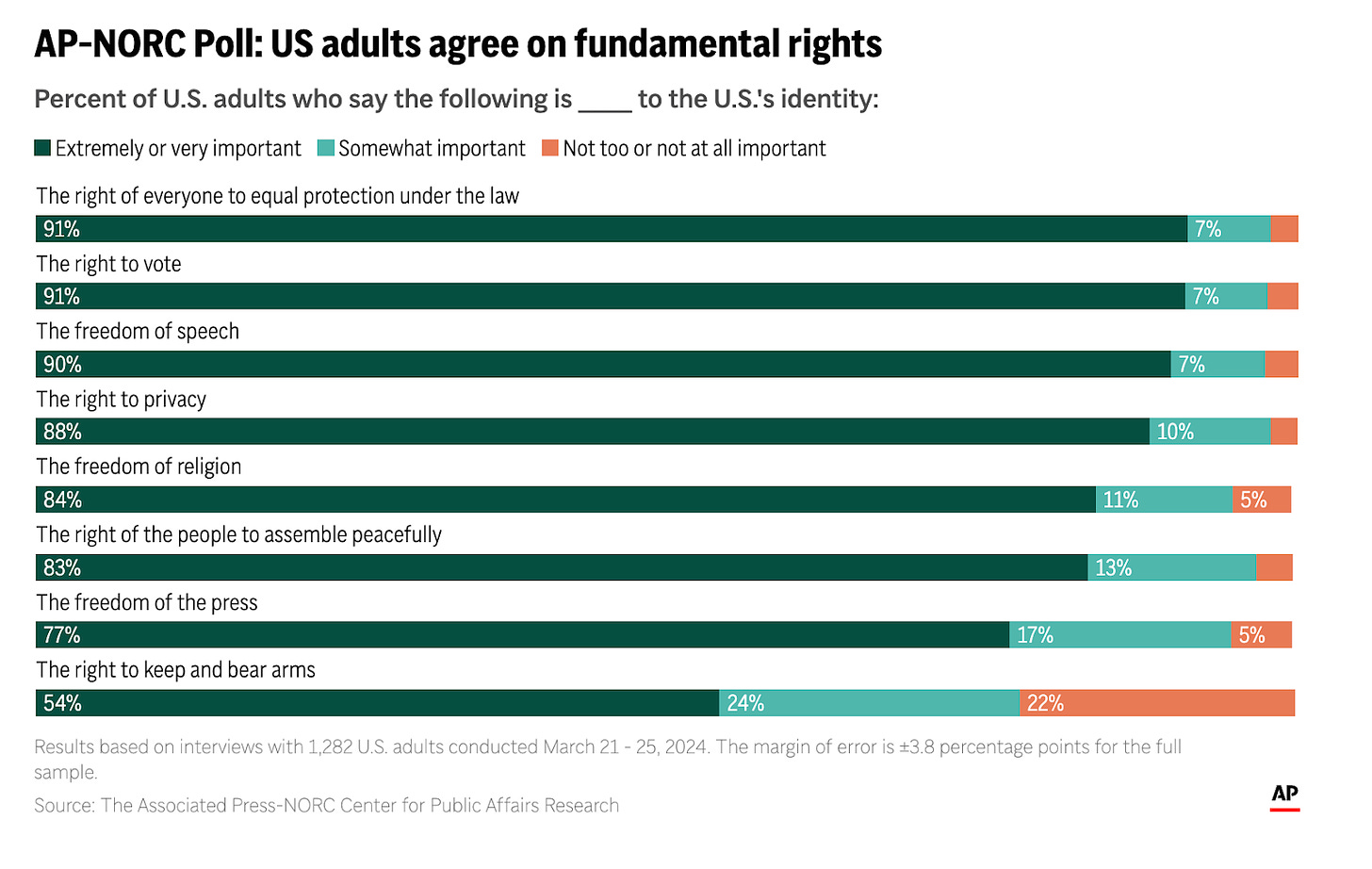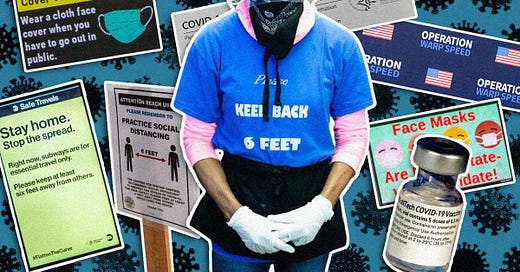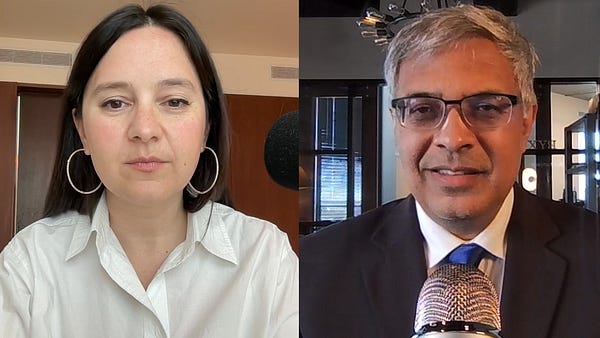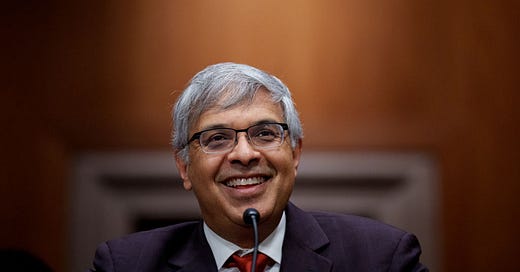
The Free Press

Some earth-shattering news hit Friday. No, not the earthquake in New York, which our Los Angeles bureau can’t stop rolling their eyes about, but The Free Press nabbing the top spot in the Substack charts. Yes, we’re number one, y’all, and we’re acting extremely chill about the whole thing. As Heather Cox Richardson surely knows, heavy lies the crown. We commit here and now to be benevolent rulers of the newsletter realm. Long may we reign, amen.
Now, back to what you signed up for.
Today, we bring you: Michael Walzer on Israel’s just war, Sally Satel on antiracism in the maternity ward, Suzy Weiss on marrying rich, ten stories we’re following, and more.
But first, our lead story.
Later today, a total solar eclipse will sweep across North America. It’s the kind of thing that should be an exciting, awe-inspiring moment for kids across the country. But some school districts are acting like the end is nigh. Here’s Rupa Subramanya on the fit of safetyism eclipsing the eclipse.
Lock Up Your Kids: The Eclipse Is Coming!
Rupa Subramanya
Today hundreds of schools across North America, from Texas to Ontario, are closing in order to protect pupils from sustaining lifelong injuries—from the sun.
Just after 11 a.m. local time, a complete solar eclipse will begin over the Pacific coast of Mexico. Its “path of totality”—the areas where the sun will be entirely blotted out—will pass through 13 U.S. states, before ending off the coast of Newfoundland, Canada. In these regions, schools face a dilemma: Is the eclipse a learning opportunity for kids—or a threat?
“The solar eclipse offers a rare educational occasion,” Natalie Jameson, an educator in Canada’s Prince Edward Island, admitted last month. “But prioritizing safety is crucial.”
And so, classes in her district will end two hours early to ensure “students will be home safely” before the start of the eclipse.
The decision, her department added, was made “out of an abundance of caution.”
Abundance of caution. You hear this phrase a lot in our era of absurd safetyism, which is reshaping modern childhood. An abundance of caution is the reason kids no longer spend time alone or play outside, depriving them of some of life’s most fulfilling experiences.
Ten Stories We’re Reading
Israel has pulled troops from southern Gaza, and only one brigade remains in the Strip. The IDF says the move does not mean the end of the war is close. (Times of Israel)
Some polls show Trump leading Biden with young voters, and Biden beating Trump among those over 45. Is an age inversion underway? (Politico)
John Fetterman blasted squatters, called for an “aggressive” approach to crime, and reiterated his support for Israel in a “summit of the schlumps” with the New York Post’s Jon Levine at a bougie Manhattan restaurant, all while wearing shorts. “I am not woke,” he said, between swigs of beer. (New York Post)
Speaking of big dudes fed up with the left, Dwayne “The Rock” Johnson has ruled out endorsing Joe Biden again in 2024. (Variety)
Colleges will soon be charging $100,000 a year. How did this happen, and who out there wants to contribute to my daughter’s 529? (The New York Times)
California lawmakers are considering a bill that would give workers the right to ignore messages from their bosses after the end of the working day. We’re told the law isn’t specifically for Bari Weiss. (KTLA)
An engine covering fell off a Boeing plane, hitting its wing flap as it took off Sunday from Denver International Airport. In other news, Boeing’s CEO made $23.6 million last year. (CBS)
A man in Quebec has had two healthy fingers amputated to relieve “body integrity dysmorphia.” The patient “was so desperate to get rid of his fingers he contemplated building a small, makeshift guillotine.” (National Post)
Trump family update from Mar-a-Lago: Melania is back. And ICYMI: Barron Trump is very big. (BI)
Kat Rosenfield isn’t a fan of Beyoncé’s reworking of “Jolene.” “What kind of feminism reserves all its opprobrium for the woman who pursues a married man, while letting the married man off the hook?” (UnHerd)
Mass General Brigham Puts Antiracism Ahead of Their Patients’ Health
The new policy could be compromising the well-being of black women and babies in the name of ‘equity,’ reports Sally Satel.
Last Tuesday, Mass General Brigham announced it will stop reporting to child welfare officials suspected incidents of abuse or neglect solely because a fetus or a newborn is exposed to drugs.
The Boston health network’s new policy also requires written consent for testing of any expectant woman or infant outside of emergency situations. It also limits testing to circumstances where results “will change the medical management of the pregnant person or infant.”
What to do about fetal exposure to drugs is a hard problem. Doctors want and need to help without frightening patients away; generally they should involve state child welfare authorities only as a last resort.
But grappling with this tension was not the motive behind the new policy. Instead, the changes were made in the name of social justice, or “health equity.”
Sarah Wakeman, MD, Mass General Brigham’s senior medical director for Substance Use Disorder, described the policy as “the latest step in our efforts to address long-standing inequities in substance use disorder care.”
A press release justifying the change noted that “black pregnant people are more likely to be drug tested and to be reported to child welfare systems than white pregnant people.”
Calling All Texans!
Our immigration debate is THIS THURSDAY in Dallas, Texas. Tickets are almost gone. Get them before it’s too late.
‘I Don’t Know If There Was Any Alternative’
Peter Savodnik spoke to political theorist Michael Walzer in mid-October about whether Israel was fighting a just war in Gaza. With the fight now entering its seventh month, Peter called Professor Walzer, the author of Just and Unjust Wars, for an update.
A week after Hamas’s October 7 attack on Israel, Michael Walzer told The Free Press that Israel’s war against Gaza was just, but he warned against the needless killing of noncombatants. “We do know what ought not to be done, and we just hope it is not done,” he said at the time.
Yesterday, I called Walzer back to see what he makes of Israel’s prosecution of this war, six months in.
“I think the IDF has been trying to adhere to the rules in an environment that probably requires some loosening of the rules,” Walzer told me.
He said: “I think that certainly the siege could have been handled very differently.”
Walzer added: “I read somewhere they have opened or allowed 20 bakeries in northern Gaza to reopen, and I thought, ‘Why did it take a phone call from President Biden to open bakeries where people are obviously hungry?’ And then I thought, ‘How can there be 20 bakeries waiting to reopen when all we’ve seen of Northern Gaza is rubble?’ So, there’s a problem in the way the war has been reported, but also the way Israel has conducted the siege.”
As Walzer sees it, Israel has stumbled into an “asymmetry trap” set by Hamas, with large numbers of Palestinian noncombatants having died.
Given that Hamas appears not to care at all about noncombatants—and, in fact, derives a PR boost every time Palestinians are killed—“I don’t know if there was any alternative,” Walzer said.
He noted, for example, that Israel’s use of massive bombs to root out Hamas’s underground infrastructure has had very mixed results.
“Some of the bombing, like the 2,000-pound bombs, were used not for targets on the surface but to get at the tunnels,” he said. “They didn’t know what would work. Those bombs did collapse some of the closer to the surface tunnels, but didn’t get at the really deep ones.”
I asked Walzer what a best-case scenario over the next six months might look like.
“A cease-fire that brings the hostages home, and then either a move toward a political way of dealing with Hamas, or a resumption of the war at a very low level that is a special-forces operation,” he said.
Also On Our Radar. . .
→ The sloppy scholarship of Judith Butler: If you’ve ever heard the phrase “gender is a construct,” you can blame Judith Butler, the nonbinary Berkeley philosopher who, incidentally, is also a Hamas apologist. Butler has a new book out called Who’s Afraid of Gender? The reviews have been mixed. But the definitive takedown has arrived, and it comes from MIT professor Alex Byrne. He writes:
Who’s Afraid of Gender? is not just poorly argued. Butler also persistently misdescribes the people and views she attempts to criticize, and her carelessness with citations would be unacceptable in an undergraduate essay. And, as if this mess wasn’t bad enough, it comes with a dollop of plagiarism on top.
It’s delicious. Read the full review here.
→ Hotbed of hate: The almost weekly demonstrations in London since October 7 have revealed alarming levels of sympathy for Hamas in the UK. Now, a new survey from the Henry Jackson Society makes clear the scale of the problem among British Muslims. It found that:
Three in four British Muslims do not believe Hamas committed murder and rape on October 7.
Thirty-nine percent of British Muslims said Hamas did not commit atrocities in Israel on October 7.
Thirty-two percent of British Muslims want to see Sharia law implemented in the UK.
Forty-six percent of British Muslims think Jews have too much power over UK government policy.
→ Don't marry for money. Go where the money is and marry for love: New York magazine has been specializing lately in features that should’ve never left the pitch meeting: a practical guide to polyamory, a deep dive on Andrew Huberman’s girlfriends, a case for kids to change their sex. The most recent is an ode—or maybe a confession?—about relationships that have large age gaps. For the writer, Grazie Sophia Christie, that means 10 years, but her love story isn’t so much about the almost-generational divide as it is about the tax bracket one.
Christie, as a Harvard undergraduate, has the epiphany that she has something that older men want: high boobs, a small waist, and, crucially, youth. So she starts camping out in the Business School Library and. . . it works! She ultimately marries the guy and now has time to cook, decorate, and “read, to walk central London and Miami and think in delicious circles, to work hard, when necessary, for free, and write stories for far less than minimum wage when I tally all the hours I take to write them.”
No shame in her game. Except the key thing is that Christie didn’t marry old. She married rich!
There’s no shame in either, but there’s a difference. The thing with confessional essays is that you have to be honest. Christie lists a “con” of her marriage is that she says thank you all the time “for splendid scenes, fine dinners” and that gets a little monotonous, and the anxiety she gets at fabulous parties that her rich, and not that old, husband takes her to. Sure thing.
While the writer here eschews “partnerships” and “same-age, same stage” dating, she isn’t a tradwife either. She seems to be stuck in a bad middle: too well-educated and smart, by her own estimations, to be a trophy wife. And too calculating and smart, by her own estimations, not to be. Sounds like inside thoughts.
She should just enjoy it. Fuss over the linens. Learn to make coq au vin. Just don’t act like you’ve discovered antibiotics. You ain’t the first and you’re certainly not the last. —Suzy Weiss
→ How divided are we, really?: A new AP-NORC survey reminds us that, for all the divides, Americans still agree on the fundamentals.
Oliver Wiseman is a writer and editor for The Free Press. Follow him on X @ollywiseman.
And become a Free Press subscriber today:






















On Israel’s need to secure Rafah, (I clicked link to “The Israeli Times”); Israel wants to evacuate civilians before engaging a military attack. But, won’t the terrorists dress in civilian clothing- so to speak? The US should flex some muscle in support of Israel.
Dear Bari,
Please provide a counter article to the one that Michael Walzer wrote. He obviously has no clear understanding of what Hamas has done and still plans to do, which is to repeat the atrocities of October 7 until all Jews are killed and Israel destroyed "from the river to the sea." Meaning all of it. There is no possible diplomatic solution to this. Nor has any army in the world, when facing a hostile, genocidal enemy, provided such enemy with "humanitarian aid," which Israel alone is expected to do and actually is doing. In addition, no other army in the world has taken so many precautions against civilian casualties as the IDF, which is made excruciatingly difficult because Hamas stores arms and hides terrorists in and under schools, hospitals, mosques, and residential neighborhoods. Any war will have civilian casualties and mistaken "friendly fire" but Israel has kept the numbers below what other armies have done, including ours in the United States. It surprises me that you would print Walzer's inept and factually weak evaluation of this just war.
Sincerely,
Mrs. Bunny Shuch